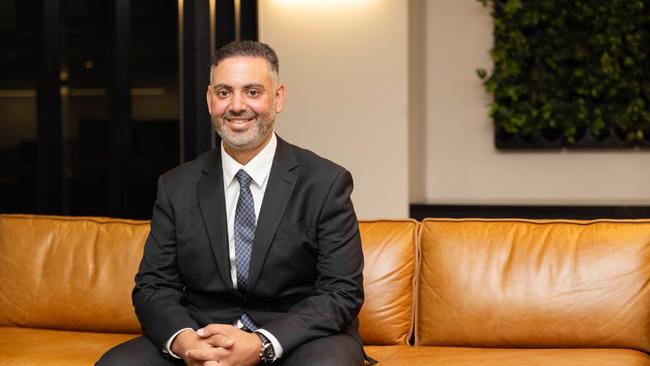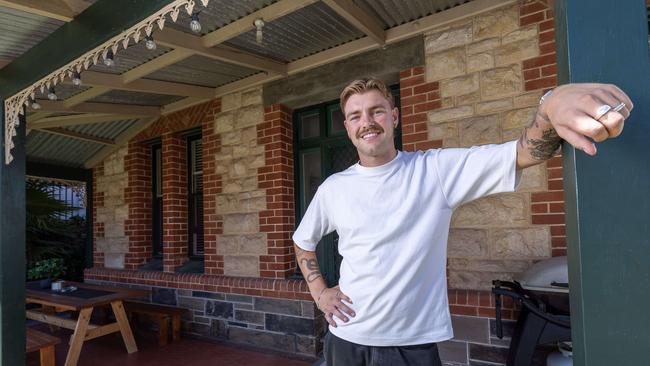Real estate investment experts share tips for getting started
Investing in real estate is a cornerstone of wealth for a majority of Aussies, but before getting started you should ask yourself this.

Business
Don't miss out on the headlines from Business. Followed categories will be added to My News.
Investing in real estate has made millions of Australians wealthier over the past 50 years, and every one of the nation’s 2.3 million landlords started somewhere.
While buying a single residential property such as a unit or house remains the most popular way of getting into the market, experts say there are other options for would-be investors.
Knowledge is power, they say, and that knowledge comes from asking questions. Here are 10 important ones to ask.
1 WHY AM I INVESTING IN PROPERTY?
You need to know why you want to invest in real estate assets, which can fluctuate, put you in hundreds of thousands of dollars of debt, and mean you must deal more with banks, tenants and others.
Metropole Property Strategists founder Michael Yardney said it was important to ask yourself what you were trying to achieve. “For most people, this is financial freedom and choices in life,” he said.
2 WHO AM I LISTENING TO?
Getting is good advice is vital, and it’s wise to get it from a variety of sources. Friends, family members or colleagues who have invested successfully in real estate is a good starting points, but independent professionals should also be used.
Mr Yardney said people should seek “independent unbiased investment advice”.
“Real estate agents are working for the vendor, and property marketers are working for the developers, and many buyers’ agents only know their home territory and will not give you options outside those,” he said.

3 WHAT IS MY TIME FRAME?
Property is a long-term investment, and many experts say it should be held for at least seven-to-10 years, which helps smooth out the impact of market cycles in a particular state or region.
Every investor needs just one real estate boom to get financially ahead, but they may have to sit through five or 10 years of a property’s value going nowhere, or backwards, to achieve that.
Mr Yardney said people should ask when they wanted to achieve their investment goals, and whether that time frame was realistic.
Beyond Bank chief customer officer Nick May said real estate was a long-term investment “so you need to be prepared and understand this before starting”.
“Property is a growth asset and, like all things, takes time to grow in value,” Mr May said.
4 WHAT IS THE TRUE COST?
Buyers agent and Mecca Property Group founder Abdullah Nouh said many buyers focus solely on mortgage repayments, “forgetting the ongoing costs associated with owning an investment property”.
“These can quickly add up and impact cash flow if not properly accounted for,” Mr Nouh said.
He said people should understand the full cost of owning real estate before committing, including council rates, water rates, insurance, property management fees of 4-11 per cent of rental income and land tax.

“Creating a cash flow calculator spreadsheet will help you break down your weekly and monthly expenses to make sure you’re financially prepared.”
Financial advisor and author of Money for Life Helen Baker said there were several upfront costs including stamp duty, conveyancing and lenders mortgage insurance (LMI) for those who had less than a 20 per cent deposit.
“LMI can often be rolled into your loan, freeing up some cash, but doing so means paying interest on it for years to come,” she said.
Ms Baker said the large sums of money used to buy property meant mistakes could be costly. “I can’t count how many times people have made mistakes when buying their first property – or how many dollars that mistake cost them, often tens or hundreds of thousands.”
5 WILL THE BANK OF MUM AND DAD HELP?
Assistance from parents and grandparents is increasingly common as the high cost of housing pushes property beyond the reach of many lower and middle-income Australians. Some are jointly investment with their children to help get them onto the property ladder.
It’s important to understand what, if any, financial help may be coming your way from the Bank of Mum and Dad.
Ms Baker said cash gifts, loans or mortgage guarantees were key ways parents could help younger buyers overcome affordability constraints.
“However, it’s not without its risks: leaving your parents financially exposed or liable if you default on your mortgage, potential tax liabilities, and lost income,” she said.
“Relationships can also become strained – your parents may think their assisting you get the property allows them to interfere in its upkeep, or your siblings may feel cheated out of future inheritance.
“Any assistance should be put in writing, agreed by everyone involved, and independently checked.”
6 WHAT ABOUT TAX?
Costly traps lurk for real estate investors who are not across the many tax rules around income, expenses, capital gains, negative gearing and depreciation. Getting good advice is vital, and people can get a better idea of tax issues by reading the ATO’s free Rental Properties Guide on its website or available to order.
The ATO is constantly cracking down on landlords’ tax returns, as it has found nine out of 10 make mistakes.
The CEO of property investment fund Benchmark Capital, Fawaz Sankari, said the best advice was to visit an accountant or financial planner with an understanding of the rules.
Beyond Bank’s Nick May agreed, because everybody’s personal situation was different. “It is important to understand that income generated from investments, including property, is subject to tax at the marginal tax rate of the owner,” he said.
7 WHEN DO I SPEAK WITH A LENDER?
As soon as you’re serious about property investing, chat with your bank or other lender.
“Your bank is a great place to start to discuss how much you can borrow and even help you to understand what the market is like in your area,” Mr May said.
“They have calculators, tools and the experience to work through the options with you and explain the fees and process of starting out as a property investor.”
Mr Yardney said it was good to secure pre-approval for finance to buy an investment property.
“Pre-approval provides clarity on your budget, strengthens your negotiating position, and ensures you can make a firm offer without finance contingencies,” he said.

8 WHERE DO I BUY?
Investors traditionally bought properties close to their home, but rising prices have pushed many to look to regional areas and interstate. Location is a key question to ask, and Mr Yardney said people should look at market trends and try to understand an area’s growth potential.
“Local expertise is crucial for making informed decisions and understanding factors that can affect the property’s value and rental demand,” he said.
Mecca Property Group’s Mr Nouh said most people would love to enter a market before everyone else did.
“Fortunately, if you look at the data on a suburb level, you can clearly see when an area is starting to see growing demand, which indicates price growth is just around the corner,” he said.
Mr Nouh said signs that suggested a looming price rise included:
• Falling rental vacancy rates.
• Infrastructure investment underway in an area.
• Jobs being created and higher-than-usual job vacancies.
• Limited housing supply, which could fuel demand.
• Properties selling quickly.
“If homes that once sat on the market for months are now selling within weeks, and transactions are rising, demand is clearly heating up,” he said.
“Shorter days on market and fewer available listings signal a shift in buyer sentiment. These are often early signs that the market is entering a new growth phase.”
9 SHOULD I DIVERSIFY?
Buying a single property is expensive, and many simply cannot afford it, but there are plenty of other ways to get into the real estate market.
Real estate investment trusts are listed on the stock exchange, can be bought and sold just like shares, and effectively give investors a slice of assets such as apartment buildings, office towers, shopping centres, warehouses or other industrial properties.
There are also property investment funds, property syndicates and fractional investment products that pool investors’ money to buy real estate assets. They can provide diversification and reduce overall risk.
Benchmark’s Mr Sankari said most financial advice centred on having a good spread of investments.
“If one part of the market dips or retracts, you have comfort elsewhere, you’re not too exposed,” he said.
“With the share market currently quite unpredictable, property looks like a very attractive proposition – it’s bricks and mortar that allow you to see exactly where your money is going.”

10 IS NOW THE RIGHT TIME?
Timing is vital to avoid short-term pain, but many investment experts will tell you any time is a good time to buy if you have a long-term focus and strong strategy.
Brisbane, Adelaide and Perth have boomed in recent years while cities such as Melbourne and Hobart have been flat, as each state and capital city moves in cycles.
Mr Yardney said it was wise to understand market trends and a property investment’s growth potential to “avoid the pitfalls of investing based on outdated or unreliable data”.
And keep emotion out of the process. “Emotional decisions can lead to poor investments,” he said. “Staying objective and focusing on the property’s financial viability is crucial for long-term success.”
Liam Wisdom, 24, is looking to invest in real estate and said the research process had been “a real eye-opener”.
“The market is competitive, and finding the right balance between price, location, and future growth is tricky,” he said.
“It’s definitely made me realise how much planning goes into it.”
Mr Wisdom said he wished he had spoken with experienced property investors earlier.
More Coverage
Originally published as Real estate investment experts share tips for getting started




